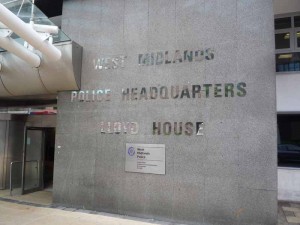From Reyhana Patel – Writer and Researcher.
Privatisation of our police services: It is a scheme the Coalition government is pushing for with the first stages set to be rolled out in the West Midlands and Surrey as early as February 2013.
But how much do we really know about who is in line to run some of our critical police services?
Very little. That is why a number of Birmingham based organisations have come together to launch a campaign to prevent the privatisation of the West Midlands police and to expose those human rights violators who may be the future leaders of our police services.
Dubbed “Human rights first! Stop the corporate takeover of West Midlands Police,” the West Midlands Against Policing for Profit is supported by the Birmingham Trade Union Council and a number of other activist based organisations. The aim of the campaign is to not only prevent human rights violators from being awarded the contracts to run critical services within West Midlands police but to protect West Midlands police from any private sector takeover.
Only a few weeks into the launch and the campaign is already creating awareness in the Birmingham community mainly through social networking and street campaigns. An online petition, hosted by the popular human rights group Avaaz, has also been gaining considerable attention. And this is no surprise. 80% of people polled in the West Midlands had no idea that their public safety was in the process of being handed over to private companies.
According to one campaign organiser: “The majority of people in the West Midlands are unaware of the private companies bidding for the contracts. It is our duty to expose these companies for what they truly are…human rights violators.”
Do we want the people who built Guantanamo Bay to run our police services?
Included among these private companies to run critical police services is the US firm Kellogg Brown & Root (KBR) which helped to build the infamous Guantanamo Bay detention camp. KBR has been successfully awarded exclusive contracts from the US government to provide services to support the invasion of Iraq. KBR’s subcontractors have also engaged in human trafficking and have utilised forced labour to provide its services in Iraq.
Another company on the shortlist is security firm, G4S which has a strong track record of human rights abuses both in and outside the UK. G4S is known for its abusive treatment of detainees and its discrimination towards asylum seekers. In 2010, it lost a Home Office forcible deportation contract after the death of an Angolan deportee, Jimmy Mubenga, while being restrained on a flight back home.
The Coalition government is also being questioned as to why such an organisation was awarded the contract to handle security for the Olympics.
If KBR and G4S are awarded the contracts, they will be running critical police services not only in the West Midlands but across the country where the privatisation scheme is set to be eventually rolled out in various locations. Critical police services include bringing offenders to justice and investigating crime, detaining suspects, managing ‘high risk’ individuals, disrupting criminal networks and responding to and managing major incidents.
These services play a major part in engaging with communities and dealing with sensitive information. As a result, these companies can easily access personal data and use it to their advantage.
Do we really want the guys who built Guantanamo Bay to hold our personal data? What would be the outcome of this? 60% of people polled said they would less likely to report a crime if they knew a third party was handling their data. That’s just a third party. What if KBR or G4S were actually running the police services? I’m sure this figure would increase tremendously.
Let’s not also forget what this would do to the strong partnerships already in place between the police and communities. Trust, legitimacy and reputation are crucial for effective police-community relations. I cannot imagine having KBR or G4S operating any activity which involves engaging with communities would be beneficial towards enhancing police-community relations.
Where is the voice of the community?
But it’s not just human rights that this campaign is defending.
West Midlands Against Police Privatisation is also looking at civil liberties and the cost effectiveness of privatisation of police services. Over £2m of police source funding is being utilised to roll out this venture. A report produced by Unison and Unite argues that no police privatisation has ever provided value for money and that police accountability and civil liberties will suffer if police services are privatised.
What is also unsettling is the process in which the Home Office has set out for the implementation of this privatisation scheme. There has been minimum consultation with the public and police staff despite this decision playing a major impact in their lives.
The measures in place to roll this out are also set out in such a way that come the Police and Crime Commissioners (PCC) elections in November, if the elected PCC was to oppose such an endeavour, these companies on the shortlist could easily file major law suits against the government.
One has to wonder why the closed doors.
The Home Office is insisting it is not privatisation but a transformation of our police services. Transformation, privatisation whatever you want to call it, these changes will play a major impact in communities and police staff across the country. So why aren’t the people having a say?
As West Midlands Police Against Privatisation argues: “The shortlisting of companies infamous for their poor human rights record demonstrates the dangers of privatising policing. These companies are implicated in the killing and maiming of people across the globe. The people of the West Midlands deserve better than this.”
Follow Reyhana Patel on Twitter
This article is reproduced by permission.
Reyhana Patel contributes to:
Contributing Writer at Suite101
